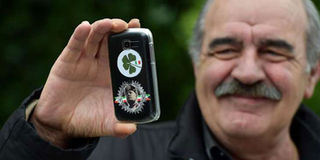Breaking News: At least 10 feared to have drowned in Makueni river
Mobile phone in hand, we can tame graft

A man holds his mobile phone showing a sticker with a portrait of Italian dictator Benito Mussolini during a rally of Far-right militants to celebrate the life and the death of Mussolini in Predappio, on April 24, 2016. Phones can be used to fight graft. PHOTO | AFP
What you need to know:
- Both government and opposition supporters are agreed that the country is drifting in the wrong direction as far as corruption is concerned.
- The President himself has declared corruption a national security threat.
- A growing body of evidence shows how information communication technologies in general and mobile phones in particular can be instrumental in detecting corruption.
- Mobile technologies have been used to provide an effective voice mechanism to hold local leaders to account.
Corruption in Kenya has become the most talked about malaise. It’s a subject that never leaves newspaper, radio and TV headlines.
Both government and opposition supporters are agreed that the country is drifting in the wrong direction as far as corruption is concerned.
According to Transparency International, Kenya is ranked 139 out of 168 countries surveyed on graft. The President himself has declared corruption a national security threat.
Internationally, the country is known for its athletics prowess, M-Pesa innovation, wonderful wildlife and sandy beaches. But Kenya is also known for endemic corruption. How unfortunate.
A growing body of evidence shows how information communication technologies (ICTs) in general and mobile phones in particular can be instrumental in detecting corruption.
We are more connected today than ever before. Mobile phones and the Internet have transformed our ability to communicate and to share information. Virtually everybody has a mobile phone.
At the very least, the phone that you have has a text messaging function, a camera and a video recorder. It connects to the social media and, if need be, can access Youtube and email.
It has remarkable opportunities for promoting good governance, increasing accountability and fighting corruption.
Although still in its infancy, there are many examples where mobile technologies have been successfully used for anti-corruption purposes — as efficient social accountability tools — and for empowering local communities to engage with political and decision making processes.
Also, mobile technologies have been used to provide an effective voice mechanism to hold local leaders to account.
With a mobile phone, you can record a police officer taking a bribe. You can take a photograph of a document with information about a corrupt deal. You can record a conversation between people planning to defraud a system. You can use the evidence to report to law enforcement agencies.
INVESTIGATIVE AUTHORITIES
You can use the evidence to discuss the matter with project management boards or investigative authorities or anyone who can take action. Better still, this information can be shared through the social media to shame the culprits and deter those with similar intentions.
Philosopher Edmund Burke said, “The only thing necessary for evil to triumph is for good men to do nothing.” We are not helpless. With technology, everyone has a voice.
You can take a photograph of a commodity meant to be distributed for free to certain groups, being sold. You can record situations of a vulnerable person — such as a child, a sick person or an old person — being molested. Or cases where human beings are unnecessarily cruel to animals. Your phone is much more than just a phone. It can liberate the society, especially when more and more people join this train.
We have witnessed sporadic instances of evidence collected by common people and shared through the social media. The effect has been varied.
Sometimes such evidence has generated serious uproar; forcing authorities to do something. Imagine if we had a critical mass of people — like you, them and I — recording such video clips, or carefully taking pictures or sound bites with the intention of sharing widely to salvage the country? Undoubtedly, corruption would be dealt a big blow.
If John Githongo was able to record meetings supposedly meant to cut deals to rob our country of billions of shillings over 10 years ago, how much more can these tools do to name and shame people bent on looting the country?
With technology, we need not be helpless bystanders. We can do something.
Wambugu is an informatics specialist. Email: [email protected] @samwambugu2





